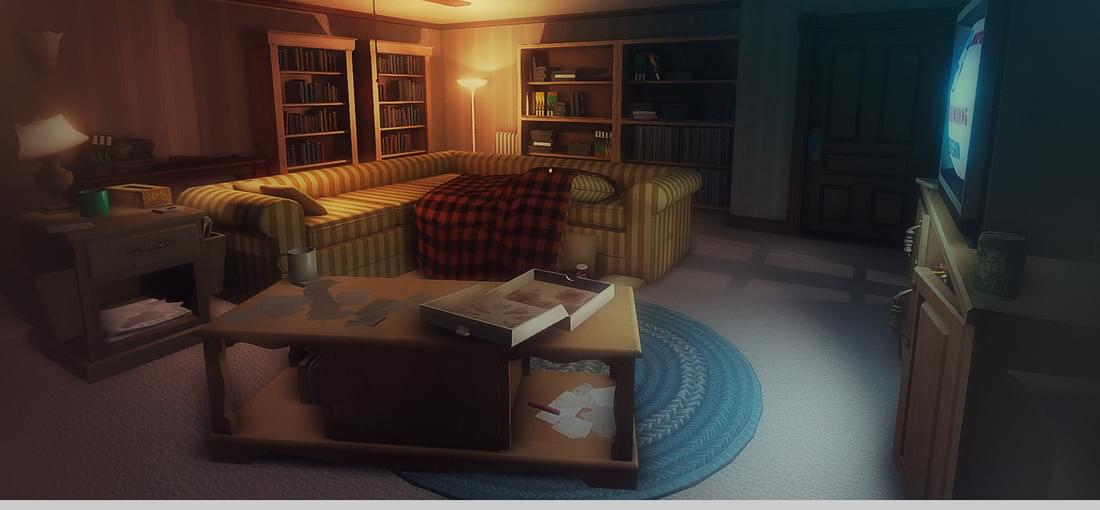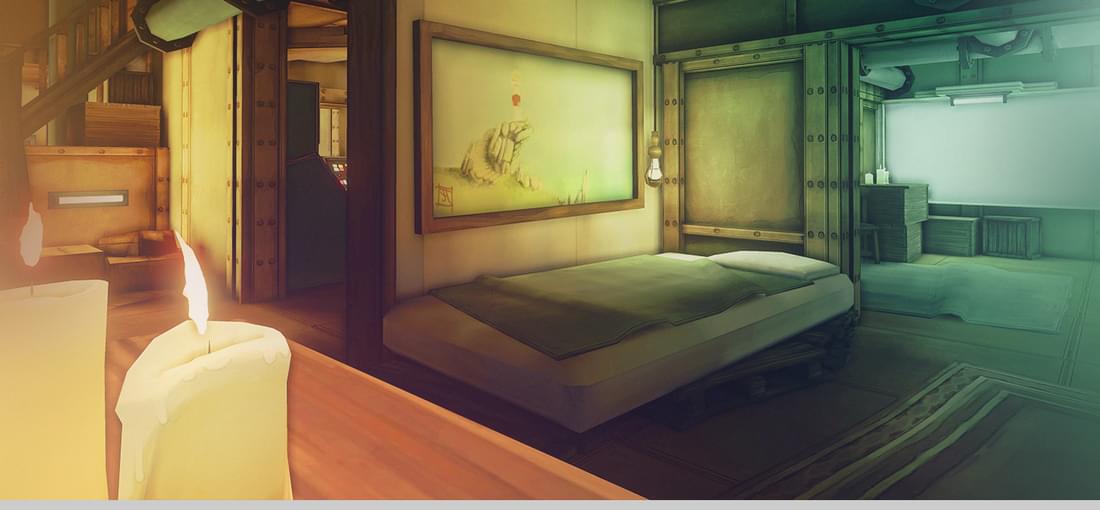


The original game is a legendary classic worthy of five stars; this modern port, however, has a really awful bug that drags its rating down. In the original engine, to cope with the severe memory and speed limitations of computers of the era, the playfield resolution drastically lowers during movement animations between locations, then switches back to higher resolution static images of the various areas. In the Nightdive port provided here - which does at least make the game playable again for the first time in many, many years - this graphical system is erratic and extremely unreliable; after any given movement between waypoints it will frequently stay stuck in low-resolution instead of showing the full resolution static render. This utterly ruins the gameplay experience, as all the beautiful pre-rendered detail of the ship cannot be properly seen most of the time that it should be.

Besides higher resolution, darker story and fouler language, this game could've come straight from the mid 90's, and not off the top shelf either. It's as if the last two decades of progress in game design never happened. It's painfully linear, geographically and in gameplay. There's one correct action at any moment that will nudge you along the rails, otherwise the game stops dead. The game deliberately slows you down, to no end. Environment and plot will frequently make you shuffle or crawl; this does not help gameplay, where movement isn't a key mechanic. In adventure, experiment and exploration are core, and slow movement ruins this. Like 90s isometric RPGs, the view of each sprawling room is broad and cannot be zoomed - useless for getting a good look at any handful of shadowy pixels you try to interact with. Whole rooms are empty, objects strewn far from where they're needed - realism and world-building aside, this makes you spend even longer trudging around. Most of this game is watching a guy walk. This gets even more frustrating with obnoxious, "do-it-again-stupid," puzzles that need you to react to new information in a fraction of a second or die, and one outright deathtrap that could only be survived if you had foreknowledge, breaking immersion. This information needs to be implied from dark and murky surroundings (I walked into one dark room and died several times before resorting to a walkthrough, and was surprised to read that a robot lurks in the shadows and guns you down if you don't take cover immediately), as the text boxes that describe non-interactive scenery in rich detail are absent when the game needs to telegraph that you're in danger. Add to this poorly-chosen autosave points and unskippable cutscenes & dialogue, and the game becomes utterly gruelling. Lastly, the plot is relentlessly foul and depressing, a nihilistic exercise in grim futility, with no underlying meaning or emotional resonance to make it worth subjecting oneself to.

This game, though flawed, still stands head and shoulders above anything else in its genre. The graphics and sound are a tour de force, the concept is brilliant and well fleshed out, the puzzles and the mechanism for triggering the different endings well considered. There are, however, two problems. First is the voice acting for the narrator - he sounds way too much like he's doing a hammy impression of Jack Nicholson in The Shining. Maybe you can tolerate this, maybe you can't. The infinitely more serious problem, as another reviewer has noted, is that the game's pacing just isn't right. Instead of slow, creeping unease, stealthily creeping into apparent normality, gradually but fitfully and unpredictably ratcheting up to a dreadful, harrowing crescendo, which is how one does a classic horror tale in any medium, this game accelerates to full speed after about ten minutes and then never lets up until finally settling down a bit towards the end, by which point you're more relieved and exhausted rather than frantic and terrified, because you burned up all your adrenaline too early and now you're just used to it, and frankly glad of a break. They should have waited MUCH longer to really start turning the screws. You shouldn't be able to know with near certainty that everything you're seeing isn't real halfway through the first chapter, and you shouldn't be able to easily guess the bulk of the entire backstory (which is, nonetheless, really quite good) by the end of that first chapter, but that's exactly what happens. Instead, you should be slowly uncovering dark hints of the past, and having just occasional moments where you doubt your own senses, for much of the first act. Pacing is everything in horror, it's the hardest thing to get right, and this game, like so many others, unfortunately missed its mark. Nonetheless, it still earns four stars because, despite the rushed delivery of its content, every last bit of that content (barring the accent) is gold.

You'll love this or loathe it. There is negligible challenge here; beating the game is not the point. This is a "journey, not destination" kind of deal. If you're introspective, progressive and able to feel empathy for people you have no relation to simply because they're people (or you're good at roleplaying someone who does have a direct relation to them, which is very nearly the exact same thought process anyway), there's a good chance you'll connect with this game; you'll especially connect with it if you know anyone who has experienced, or have experienced yourself, some of the still all-too-common issues raised therein. Sure it's cliché, but life is cliché. Countless people all over the world go through the exact same experiences, over and over. The game's very ordinariness is its entire point. One does not have to pick an extraordinary subject to produce extraordinary art. If you're looking for fantastical escapism, look elsewhere. If you're the sort of person to dismiss the ordinary and commonplace as inherently disinteresting, DEFINITELY look elsewhere. If you're the sort to find interest in a heartfelt rendition of just the everyday, ordinary human experience, give it a try.

Clever, beautiful, haunting, humane. This is a lovingly created experience for the more thoughtful, introspective player, who really wants to truly visit a place - and that place just happens to be the deepest and dearest memories inside someone's head. Ether One is something of a throwback. "Immersive" used to be one of the hottest videogame buzzwords in the early 90s, its heralds developers like Cyan, of Myst and Riven fame, but these days, as long as the game is visually realistic and may be comfortably navigated and interacted with, it is taken for granted. Nobody remarks about it any more; as a culture, we've got the knack of suspending our disbelief if only the graphics are stunning and mechanical gameplay is smooth. Ether One is different; it pushes far beyond reliance on mere technical merit. True immersion means building an entire world - one of history, culture, personal relationships, emotion, depth - and Ether One is without recent comparison there. It's a game about love and life, sadness and death, about work and play, about the cold dank smell of a mineshaft, and the taste of cider on May Day - and, above all, what that meant to someone. This game is so immersive, it damn well holds your head under - despite a relatively low polycount and fairly simple textures (more on that below), it feels more truly real than any game I could name in recent times. It makes you feel a connection to everything in it; this is a place you truly inhabit, and I haven't felt myself so drawn into a game for years. The downside: it's been my consistent experience that the most creatively and artistically innovative games tend to suffer on technical execution a bit, and this game is sadly no exception. The large levels are seemingly not well optimised, despite their relative geometric simplicity, and bring my computer to a juddery crawl, though it has comfortably rendered much more complex scenes in other titles. You'll need quite a beefy machine to play this one.